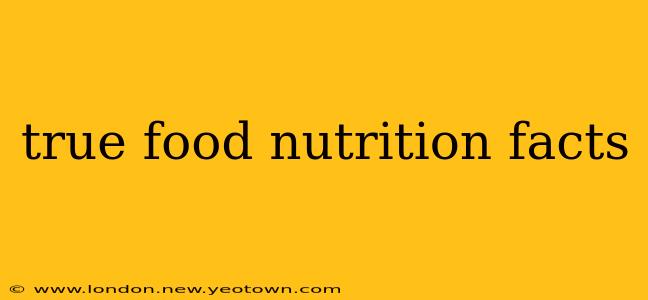We've all been there, staring at nutrition labels, deciphering the cryptic codes of grams, percentages, and serving sizes. But how much of that information truly reflects the nutritional value of the food in front of us? This isn't just about calories; it's about understanding the complex interplay of vitamins, minerals, and bioactive compounds that truly fuel our bodies. Let's peel back the layers and uncover some true food nutrition facts.
What are the most important nutrients in food?
This isn't a simple "top 5" list, as the importance of different nutrients varies dramatically depending on individual needs, age, activity levels, and overall health. However, some nutrients consistently stand out as foundational:
- Macronutrients: These provide energy. Carbohydrates are our primary fuel source, proteins build and repair tissues, and fats are crucial for hormone production and nutrient absorption. The balance of these is key.
- Micronutrients: These are essential in smaller amounts but play critical roles. Vitamins (like A, C, D, and the B vitamins) and minerals (like iron, calcium, and zinc) are vital for countless bodily functions. Deficiencies can lead to significant health problems.
- Fiber: Often overlooked, fiber is crucial for digestive health, regulating blood sugar, and lowering cholesterol. It's found in fruits, vegetables, and whole grains.
Understanding the proportions of these nutrients in your diet is far more valuable than focusing solely on calorie counts.
How can I tell if food is truly nutritious?
Navigating the supermarket can feel like navigating a minefield of marketing jargon. Here are some key indicators:
- Whole, unprocessed foods: The closer a food is to its natural state, the better. Think fruits, vegetables, whole grains, legumes, and lean proteins.
- Nutrient density: Look beyond calories. A nutrient-dense food provides a high amount of vitamins, minerals, and fiber relative to its calorie content. Leafy greens are a prime example.
- Minimal added sugar, salt, and unhealthy fats: These often add calories without significant nutritional benefits. Check the ingredient list carefully.
What are some common misconceptions about food nutrition?
Misinformation abounds in the nutrition world. Let's debunk some common myths:
- Myth: All fats are bad. Truth: Unsaturated fats (found in avocados, nuts, and olive oil) are essential for health. It's saturated and trans fats that we need to limit.
- Myth: Organic food is always significantly more nutritious. Truth: While organic farming practices can minimize pesticide exposure, the nutritional differences between organic and conventionally grown foods are often small. However, supporting sustainable agriculture is important for environmental reasons.
- Myth: Juicing is a healthy way to consume fruits and vegetables. Truth: Juicing removes fiber, a vital component of fruits and vegetables. Eating whole fruits and vegetables is always preferable.
Are there specific foods that are particularly nutritious?
Numerous foods pack a nutritional punch. Some examples include:
- Berries: Rich in antioxidants.
- Leafy greens: Excellent sources of vitamins A, C, and K.
- Fatty fish (salmon, tuna): Provide omega-3 fatty acids.
- Legumes (beans, lentils): Excellent source of protein and fiber.
- Nuts and seeds: Rich in healthy fats and fiber.
How can I improve my diet’s nutritional value?
The key is to make gradual, sustainable changes. Start by incorporating more whole, unprocessed foods into your diet. Focus on variety—the wider the range of fruits, vegetables, and other whole foods you consume, the more likely you are to meet your nutritional needs.
This journey to understanding true food nutrition facts is ongoing. By being informed, curious, and focusing on whole, unprocessed foods, you'll be well on your way to nourishing your body with the nutrients it truly needs. Remember to consult a registered dietitian or healthcare professional for personalized dietary advice.

